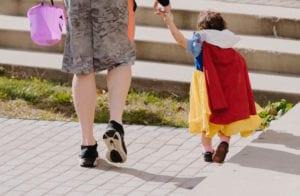Who is a member?
Our members are the local governments of Massachusetts and their elected and appointed leadership.

Cities and towns are grappling with how to celebrate Halloween during the COVID-19 pandemic.
For Salem Mayor Kimberley Driscoll, it’s been looming since the start of the pandemic: what to do about October’s month-long “Haunted Happenings,” when the spooky capital of the U.S. typically welcomes nearly 500,000 visitors.
The city and myriad private cultural and tourism organizations began planning this year’s events back in November 2019 – as always, on the heels of Halloween night. Four months later, a new monster came to town and all bets were off.
Large gatherings such as parades and costume balls were cancelled months ago, in line with state COVID-19 guidance.
“But that’s not to say people aren’t coming,” Driscoll said. “Hotels are full. We know people are going to come here.”
After observing the number and behavior of visitors during “Septober” – Salem’s term for the last weekend of September, the city last week added new precautions. These include an expanded mandatory mask zone downtown, restrictions regarding vendors and street performers, a decision to require reservations for local attractions in order to avoid lines and crowds, and Salem’s own version of the Commonwealth’s out-of-state travel form, which warns hotel and Airbnb guests that the city will be checking for compliance with testing and quarantine requirements.
Salem will also remain in Step 1 of Phase 3 of the state’s reopening plan in October, despite the governor’s decision to move to Step 2 of Phase 3 effective Oct. 5, Driscoll said.
In terms of trick-or-treating and other activities on Oct. 31 itself, the city is taking a wait-and-see approach.
“We want to better understand how the month begins,” Driscoll said. “We have not finalized any Halloween activities yet. We haven’t finalized any guidance for families. But there’s definitely a lot of thought going into it.”
Plans from around Mass.
While not impacted to the same degree as the Witch City, many other municipalities are grappling with how to celebrate Halloween while curbing the spread of COVID-19.
There is perhaps no other holiday associated with pure fun the way Halloween is: one night of the year when kids don disguises, scamper through their neighborhoods by moonlight, and collect sacks of free sweets. There is a certain magic to it, which prompted Somerville City Councillor Ben Ewen-Campen to propose a resolution last month, “That the Administration and this Council create safe guidelines for this year’s Halloween so kids can have a safe and spooky holiday.” It passed unanimously, and plans are in the works.
“We know it will be different and, of course, we will be following [guidance from the U.S. Centers for Disease Control and Prevention],” said Ewen-Campen. “And we are committed to planning a fun and haunted Halloween that we can all look forward to.”
The CDC guidance identifies low-, moderate-, and high-risk Halloween activities, and recommends avoiding “traditional trick-or-treating where treats are handed to children who go door to door,” as well as indoor costume parties and haunted houses and popular fall activities such as hay rides.
 After months of cancelling community events, North Adams Mayor Tom Bernard dreaded adding Halloween to the list. Noting his city’s favorable record with the virus, Bernard last week rolled out the city’s GHOST protocol, a list of recommendations for a safe Halloween.
After months of cancelling community events, North Adams Mayor Tom Bernard dreaded adding Halloween to the list. Noting his city’s favorable record with the virus, Bernard last week rolled out the city’s GHOST protocol, a list of recommendations for a safe Halloween.
They are:
• “Grab and Go” goody bags, rather than letting children reach into a communal bowl
• Have fun
• Only trick-or-treating at homes lit or decorated to indicate participation
• Stay close to home
• Take your mask
The guidance also warns against activities such as haunted houses and parties with non-household members that could increase risks of contracting COVID-19.
Joking that “nothing says ‘fun’ like added rules and regulations,” Bernard nonetheless warned that the city “might need to cancel trick or treat” if there’s a sharp increase in COVID-19 cases this month.
In Revere, Mayor Brian Arrigo isn’t cancelling trick or treating, but he is strongly promoting an alternative to the time-honored house-to-house version. Revere, which has persisted in the state’s coronavirus “red zone” since mid-summer, is offering a by-reservation-only “trunk or treat” event from 12 to 4 p.m. on Halloween. Parks and Recreation Director Michael Hinojosa said residents will be able to register on the city website starting Oct. 7. The event will take place at the Revere High School and Rumney Marsh Academy parking lots, where Revere elected officials, department heads and others will distribute candy to youngsters from the trunks of 20 to 25 decorated cars.
Hinojosa said the event will accommodate up to 60 cars per half hour, with trunk-or-treaters receiving a QR coded ticket for their time slot when they register. Each vehicle must have one adult who stays in the car and another who chaperones costumed occupants to the treat stations. Hinojosa said the city purchased new software to accommodate the registration and ticketing process. Going forward, the software will also be used to manage traffic at other events drawing large numbers during the pandemic – such as food distribution programs, he said.
“For a 4-year old, picking out that right costume … putting that costume on is everything,” Hinojosa said. “That age doesn’t last that long. We are just trying to create a safe way for them to do that this year.”
Banding together
For three municipalities in the state’s northeast corner, collaboration is deemed key to keeping everyone safe. Amesbury, Newburyport and Salisbury have teamed up to make sure Halloween guidance is consistent across borders.
“Since the pandemic began, I’ve had a regular tri-town call with Newburyport and Salisbury to stay in touch and up to speed on issues that were impacting our communities, so it made sense for our towns to work together on a plan for trick-or-treat,” said Amesbury Mayor Kassandra Gove. “Certainly, it impacts us all if one community were to cancel the event. We risk having those residents come here to participate, which isn’t ideal from a health, safety and contact tracing perspective.”
To that end, Gove’s staff created three versions of a flyer outlining the low-, moderate-, and high-risk activities defined by the CDC. The flyer makes clear “that traditional trick-or-treating really isn’t recommended this year,” Gove said. Recommended instead are grab-and-go goody bags set up in driveways and yards, or having a “small group, outdoor costume parade.”
For some MetroWest communities, 2020 is the second consecutive year a public health emergency has threatened to upend Halloween. Last year, it was concern about Eastern Equine Encephalitis, which led to stricter guidance for and cancellation of some Halloween activities.
“This is obviously a whole different stratosphere,” Holliston Town Administrator Travis Ahern said. “But it isn’t something that hasn’t been discussed before by Emergency Management and the Board of Health. We’ve had to intervene on Halloween before.”
Ahern said he expects an Oct. 6 Board of Health meeting will yield a set of guidelines for Holliston residents that will largely reflect guidance from the CDC.
Written by Lisa Capone